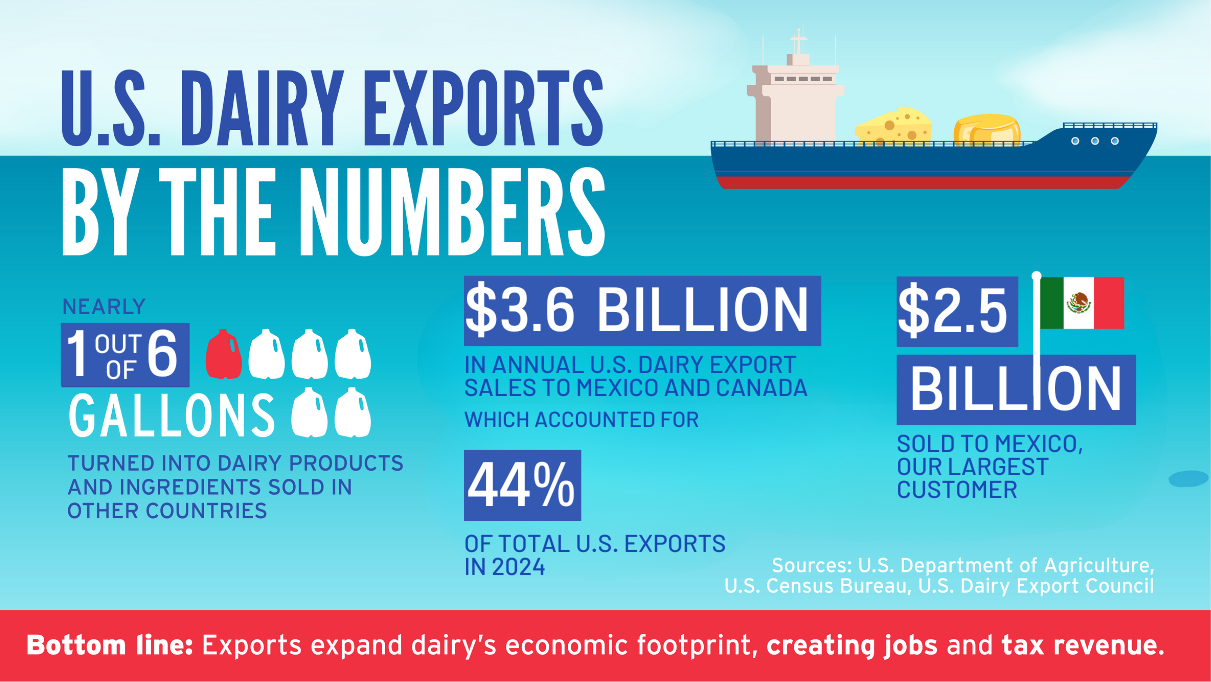U.S.–Mexico–Canada Agreement
The U.S.-Mexico-Canada Agreement (USMCA), signed into law in January 2020, improved dairy trade with Canada and solidified trade relations with Mexico. Enforcing the agreement’s dairy provisions remain key to realizing and maintaining these gains.
While USMCA does not address the full range of Canada’s problematic tariff and non-tariff policies, it makes important advances such as reforms to Canada’s controversial dairy pricing system. However, Canada’s sustained and longstanding efforts to undermine access to its market and lower the benefits of the trade agreement to the U.S. dairy industry continue to pose deep concerns.
USMCA also strengthens U.S. dairy’s relationship with Mexico, the top export destination for U.S. dairy products. The agreement preserves duty-free access for U.S. dairy in Mexico and establishes new protections for products that rely on common cheese names, such as parmesan and swiss cheese. Recent anti-trade sentiment and technical barriers imposed by Mexico threaten to undermine this longstanding trade relationship.

Our Position
NMPF supports aggressive action to ensure that Canada and Mexico fully comply with their USMCA commitments. Congress must work with the U.S. Trade Representative and USDA to enforce USMCA’s dairy-related provisions to prevent Canada or Mexico from undermining the benefits the deal offered for U.S. dairy producers.
Key Points
- Mexico and Canada are two of the largest markets for U.S. dairy product exports, accounting in recent years for more than 44 percent of the total value of U.S. dairy product exports.
- USMCA strengthens U.S. dairy’s relationship with Mexico and establishes new protections for products that rely on common cheese names. However, Mexico has taken or is considering several actions that can restrict trade, making the defense of smooth and open access to one of U.S. dairy’s top export markets essential.
- USMCA’s text fundamentally changes Canada’s trade-distorting policies and reforms Canada’s controversial dairy pricing system including by eliminating its Class 7 program. It also provides exclusive Canadian market access for U.S. farmers and manufacturers. However, Canada’s tariff rate quota (TRQ) administration is designed to discourage their full use and value—in violation of its USMCA obligations—which limits U.S. dairy product imports. Specifically, Canada reserves the bulk of quota access to Canadian processors, who have little incentive to import U.S. dairy products, while failing to grant access to retailers, restaurants, importers, food service providers and other stakeholders throughout the supply chain.
- NMPF worked with USTR to launch a USMCA dispute settlement case in May 2021, with the United States prevailing in a ruling that Canada’s TRQ allocations violated the agreement. However, Canada still failed to meaningfully amend its TRQ allocation policies, prompting USTR to initiate a new panel in January 2023. An adverse ruling from the dispute panel in November 2023 enabled Canada to continue restricting dairy access for U.S. producers.
- Canada also circumvents USMCA dairy protein export disciplines by pushing artificially low-priced dairy proteins out via other loophole tariff codes, undercutting U.S. products both domestically and in global markets.
- The upcoming 2026 USMCA review process represents a critical opportunity to permanently correct these issues. NMPF will continue to work with members of Congress and the administration to ensure that these outstanding issues with Canada are addressed, Mexico fully implements its common names commitments and American dairy producers and exporters receive the full market access that was originally promised in the agreement.





